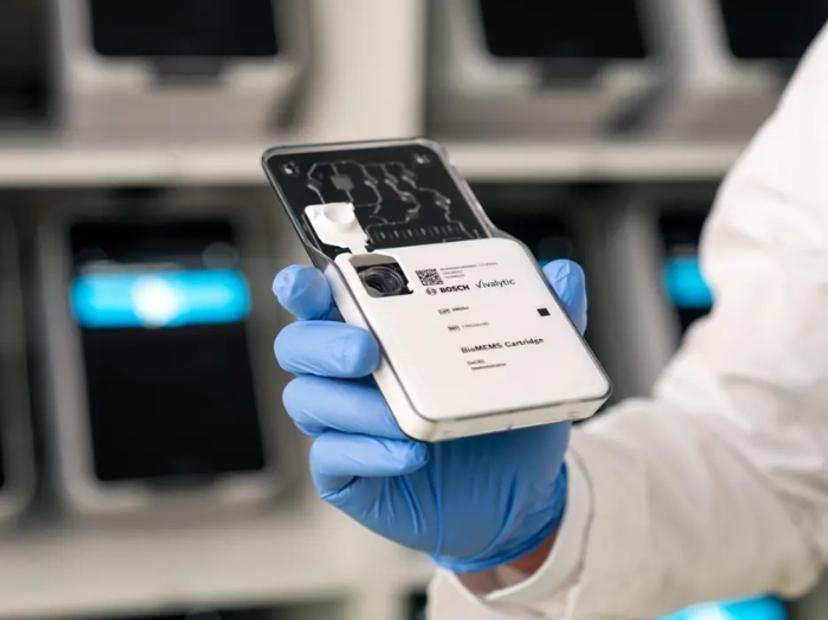Bosch and Randox invest in the Vivalytic analysis platform
Smartphone-sized laboratory – Sepsis IVD grade test based on cutting-edge BioMEMS technology is a joint development objective
10 Apr 2024

With many diseases, every minute counts, and determining whether a patient is presenting the symptoms of a simple cold, the flu, or something as severe as life-threatening meningitis is usually only possible after time-consuming and expensive laboratory diagnostics. With its Vivalytic analysis platform, Bosch has set itself the goal of making fast and highly precise diagnostics accessible at the point of care – and aims to use molecular diagnostics to become a leading provider in the market by 2030. To achieve this, Bosch has now agreed on a strategic partnership with Randox Laboratories Ltd., a diagnostic and medical technology company.
The two companies will invest around 150 million euros in joint research, development, and sales activities for new tests for the Vivalytic analysis platform provided by Bosch Healthcare. One goal is the development of a sepsis IVD grade test that will be the first to feature highly innovative and novel BioMEMS technology.
Bosch Healthcare Solutions and Randox already collaborated during the Covid-19 pandemic. In spring 2020, Bosch launched one of the world’s first fully automated PCR tests for the SARS-CoV-2 coronavirus. Together with Randox, the rapid test for use in doctor’s offices, nursing homes, testing stations, and hospitals was made ready for the Vivalytic analysis device within the space of just a few weeks.
Sepsis test based on BioMEMS technology
One focus of the development partnership with Randox is the implementation of a highly sensitive multiplex test for sepsis on the Vivalytic analysis platform. Sepsis, also known as 'blood poisoning', is a potentially life-threatening complication that can occur in conjunction with various infectious diseases. Sepsis is a medical emergency that can lead to multiple organ failure and therefore requires immediate medical treatment. The planned IVD grade sepsis test is to be based for the first time on the highly innovative and novel BioMEMS technology developed by teams from Bosch corporate research in Renningen and Bosch Healthcare Solutions in Waiblingen.
From microfluidics to nanofluidics
The powerful BioMEMS chip adds a further innovative analysis method to the Vivalytic test cartridge, enabling it to test simultaneously and significantly faster for a large number of different pathogens. It is called BioMEMS because it combines microelectromechanical systems (MEMS) with microfluidics for applications in the field of medical technology. In microfluidics, very small amounts of fluid in the microliter range are moved in a very small space. Miniaturization allows qualitative biochemical polymerase chain reactions (PCR) to run in parallel in real-time on a single BioMEMS chip.
With the new BioMEMS technology, Bosch promises fully automatic testing of up to 250 genetic characteristics (e.g. pathogens) in one cartridge in less than 15 minutes. Another future advantage of BioMEMS will be a simpler and faster adaptation of new tests or existing tests on the chip itself. For example, existing tests can easily be expanded to include additional features.
The Vivalytic platform
The advantages of carrying out PCR tests on the Bosch Vivalytic platform lie not only in speedy analysis but also in the ease of use, once the sample has been taken, it is placed in the test cartridge. The cartridge, which contains all the necessary reagents for the respective test, is then inserted into the Vivalytic analyzer for automated evaluation. Medical staff require only brief training on how to operate it. This enables fast and targeted diagnostics directly at the point of sample collection – either at the doctor’s office or in the hospital – without the often long and time-consuming detour via a central laboratory.
Bosch Healthcare Solutions already distributes various tests for diseases of the upper and lower respiratory tract, such as SARS-CoV-2 – also as a pooling variant and as a saliva test – or a test to differentiate between SARS-CoV-2, RSV virus and influenza. There are also tests for pathogens that cause sexually transmitted infections (STI) and MRSA / SA ('hospital germ'). Starting in the summer, it is planned to expand the portfolio with tests for whooping cough (Bordetella holmesii, Bordetella parapertussis, and Bordetella bronchiseptica), urinary tract infections (UTI), bacterial meningitis, the two most common sexually transmitted diseases (Chlamydia trachomatis; CT and Neisseria gonorrhoeae; NG), fungal infections (Candida auris), and three tests for diarrheal diseases (norovirus, Clostridioides difficile, HSP).
